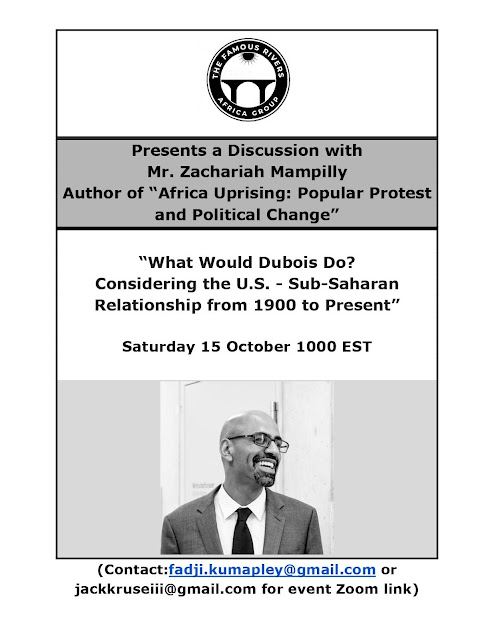NOTE: This session was held on 23 January 2021.
A recording is available at our Facebook Group Page. Alternatively, members can contact Fadji or Jack for a link to the YouTube recording.
A recording is available at our Facebook Group Page. Alternatively, members can contact Fadji or Jack for a link to the YouTube recording.
Doctor Harry Verhoeven Biography:
Harry is the Convenor of the Oxford University China-Africa Network. He is an Associate Member of the Department of Politics & International Relations of the University of Oxford and the editor of the Cambridge University Press book series on Intelligence and National Security in Africa & the Middle East. He is the author of Water, Civilisation and Power in Sudan: the Political Economy of Military-Islamist State Building and Why Comrades Go To War. Liberation Politics and the Outbreak of Africa's Deadliest Conflict. Harry is a Senior Adviser to the European Institute of Peace.Discussion Questions:
- In your opinion, how have recent political and security developments in Sudan (Bashir’s ouster) and Ethiopia (Tigray) affected appetite for energy-driven regional integration? Specifically, how do you anticipate the conflict in the Tigray region will affect the strength of Ethiopia’s negotiating position with regard to the GERD? What role could Eritrea play in all of this?
- An interesting data point for me was the contrast between energy consumption in the UK vs Ethiopia (5,500 vs 37 kWh per person). Against the backdrop of climate change and with efforts by countries such as Ethiopia to develop/industrialize, I think this raises important questions over global efforts to address greenhouse gas emissions. How have projects such as the GERD construction factored into international efforts to address climate change (I am talking specifically about the Paris Climate Agreement, which the new administration just rejoined)? Shouldn’t the international community be more supportive of this project and support an energy-driven regional integration approach? From an infrastructure perspective Is Ethiopia prepared to harness the potential power output from the dam when finished? What will be the power benefits to the region at large?
- Are there cautionary lessons that can be gleaned from other major dam projects applicable here?
- Do you have any sense as to how the new current administration will view the ongoing negotiations, particularly with regard to the current US-Egypt relationship, and the recent suspension of ongoing aid to Ethiopia under the previous administration? At least in Ethiopia, the U.S. stance on the GERD visibly turned the tide of public support towards the U.S.
- Is there an authoritative international governing body or legal framework that governs the use of water resources from rivers traversing multiple countries--akin to the UNCLOS: UN Convention on the Law of the Sea? How is the approach being used in other nations?
- Has Egypt been using its water responsibly for the last few decades? What does responsible water management look like for a downstream riparian country?
- Egypt, Sudan, Ethiopia, and the AU? What are the alliances playing out and with the potential to play out?
- What are the GPC-related concerns with regard to the Chinese financing associated with the GERD's turbine equipment, etc. ?
- You've had an impressive, widely-traveled career already? Aside from surviving the winter in Buffalo, what have been your famous rivers in your career?
.




